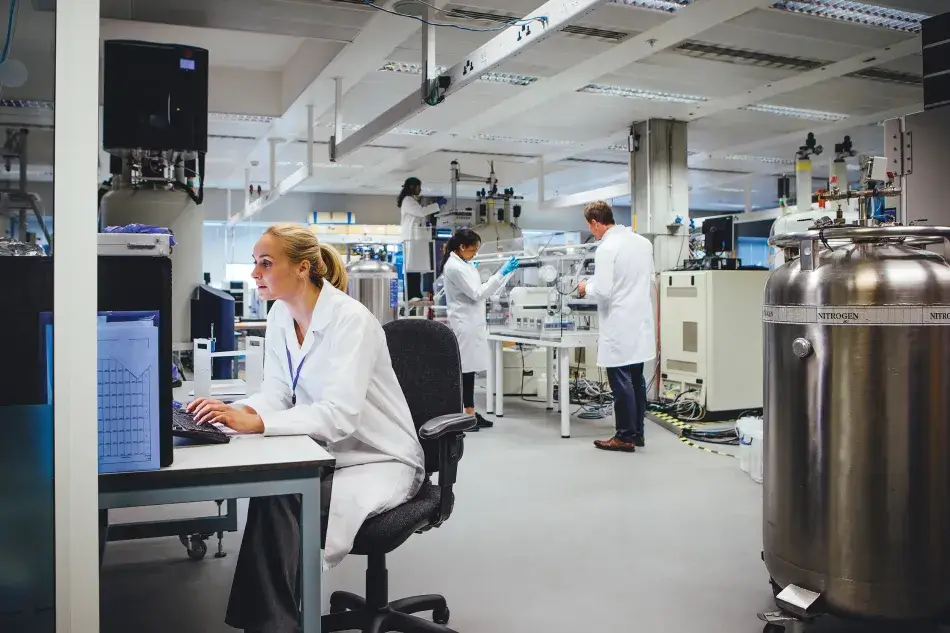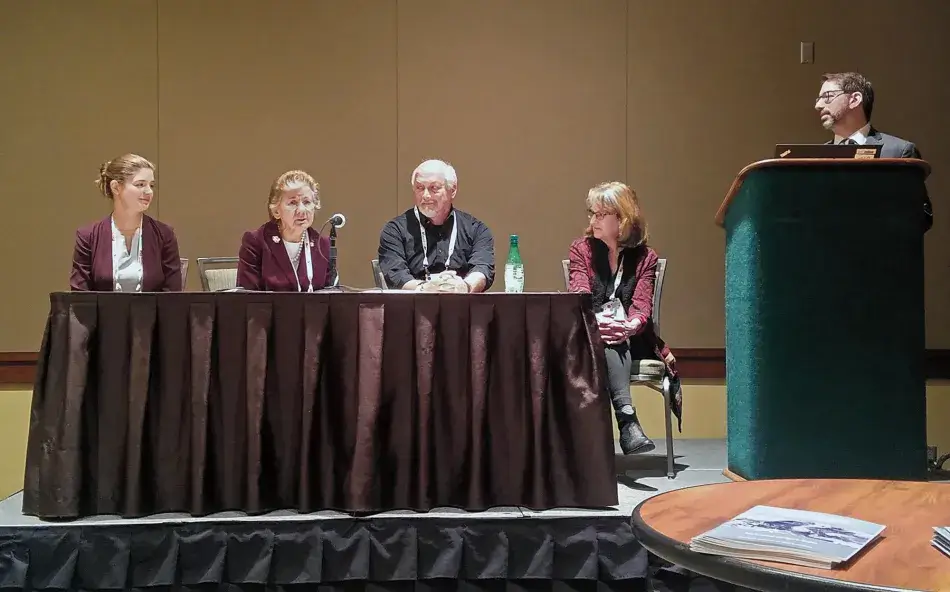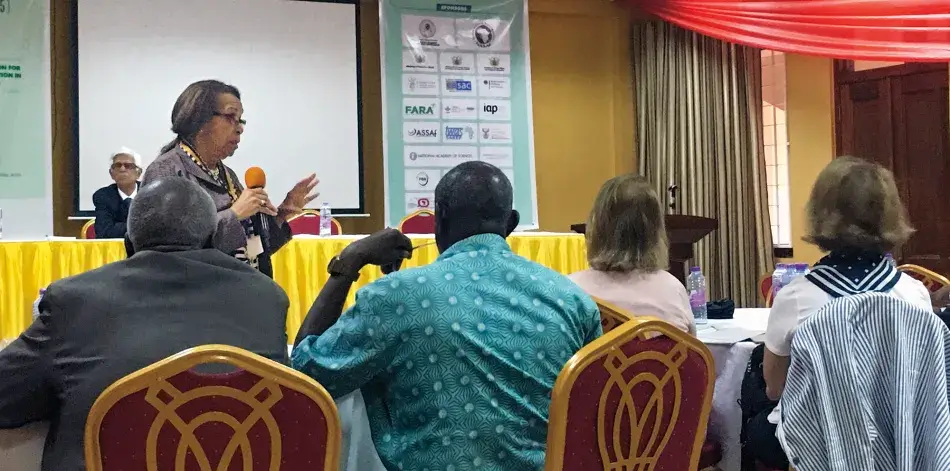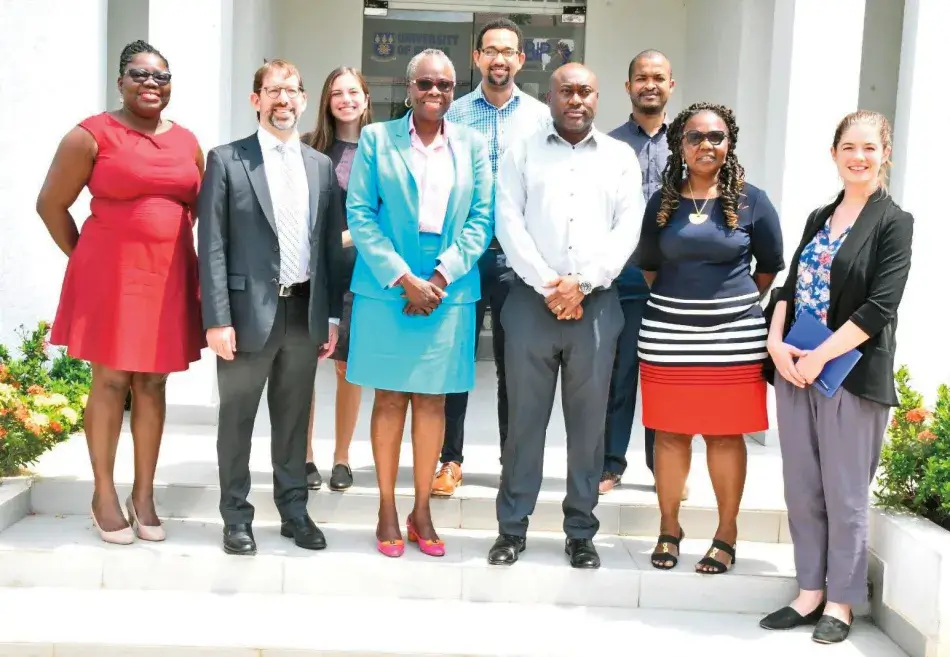Science, Engineering, and Technology

Academy projects in Science, Engineering, and Technology seek to strengthen the capacity of science and engineering to improve the human condition. This goal has never been more important for the nation or for the world. Global challenges increasingly require collaboration across disciplinary, professional, and national boundaries, while rapid advances in information processing and transmission raise new issues for both the management of scientific and technical information and for the ability of individuals and institutions to assimilate and act on new discoveries.
Drawing on the broad expertise of its membership and outside experts, Academy studies in Science, Engineering, and Technology analyze the impact of advances in these areas and develop policy recommendations that are made available to government, academia, nongovernmental organizations, and the private sector. Activities focus on increasing public understanding of current research and technological change, and on helping society adapt effectively and make meaningful use of new scientific and technical knowledge. Areas of interest include U.S. productivity in science and engineering; public understanding of, and trust in, science, engineering, and medicine; strengthening U.S. participation in international scientific collaboration; and climate change policy.
Program Advisory Committee
CHAIRS
Alan Leshner
formerly, American Association for the Advancement of Science
Geraldine L. Richmond
University of Oregon
MEMBERS
Nancy C. Andrews
Duke University School of Medicine
Mary Beckerle
University of Utah
Arthur Bienenstock
Stanford University
Emery Brown
Massachusetts Institute of Technology; Harvard Medical School; Massachusetts General Hospital
Claude Canizares
Massachusetts Institute of Technology
David Clark
Massachusetts Institute of Technology
Wayne Clough
Georgia Institute of Technology; formerly, Smithsonian Institution
Robert Horvitz
Massachusetts Institute of Technology
Leah Jamieson
Purdue University
Cora Marrett
National Science Foundation
James Simons
Simons Foundation
Jeannette Wing
Columbia University
PROJECT
The Public Face of Science
The Academy’s multiyear initiative on the Public Face of Science addresses various aspects of the complex and evolving relationship between scientists and the public and examines how trust in science is shaped by individual experiences, beliefs, and engagement with science. Additional project activities have included published work on the role of science in the legal system and the coordination and deployment of scientific teams as part of crisis response. The initiative has brought together a broad range of experts in communication, law, humanities, the arts, journalism, public affairs, and the physical, social, and life sciences. While this project does not directly address scientific literacy in K-12 and adult education, it will inform such efforts by fostering a greater understanding of the public’s attitudes toward science.
The third and final project report of the initiative, entitled The Public Face of Science in America: Priorities for the Future, presents a series of proposed policy recommendations for target audiences to improve the practice of science communication and engagement. This report was informed by the findings of the earlier publications of the initiative, Perceptions of Science in America and Encountering Science in America, which aggregated data both on how Americans view the role of science in society and how they interact with science in their everyday lives.
Project Chair
Richard Meserve
Covington & Burling LLP; formerly, Carnegie Institution for Science
Steering Group Members
Emilio Bizzi
Massachusetts Institute of Technology
Geoffrey Cowan
University of Southern California
Ellen Futter
American Museum of Natural History
Sylvester James Gates, Jr.
Brown University
Robert Hauser
American Philosophical Society
Rush D. Holt, Jr.
formerly, American Association for the Advancement of Science
Kathleen Hall Jamieson
University of Pennsylvania
Venkatesh Narayanamurti
Harvard University
Nora Newcombe
Temple University
Kenneth Prewitt
Columbia University
Rebecca Rimel
Pew Charitable Trusts
Cristián Samper
Wildlife Conservation Society
Samuel Thier
Harvard Medical School; Massachusetts General Hospital
Project Staff
Erica Kimmerling
Tania Munz
John Randell
Rebecca Tiernan
Amanda Vernon
Funders
Gordon and Betty Moore Foundation
Rita Allen Foundation
Alfred P. Sloan Foundation
Project Publications
The Public Face of Science in America: Priorities for the Future (American Academy of Arts and Sciences, 2020)
Science During Crisis: Best Practices, Research Needs, and Policy Priorities, Rita R. Colwell and Gary E. Machlis (American Academy of Arts and Sciences, 2019)
The Public Face of Science Across the World, Matthew C. Nisbet and Erik C. Nisbet (American Academy of Arts and Sciences, 2019)
Encountering Science in America (American Academy of Arts and Sciences, 2019)
Perceptions of Science in America (American Academy of Arts and Sciences, 2018)
“Science & the Legal System,” Dædalus, edited by Shari Seidman Diamond & Richard O. Lempert (2018)
Project Meeting
Science During Crisis: Panel Presentation at the Annual Meeting of the American Association for the Advancement of Science
February 14, 2020
Washington State Convention Center
Seattle, WA
Science During Crisis authors Rita Colwell (University of Maryland) and Gary Machlis (Clemson University) discussed the importance of science in crisis responses ranging from pandemics to environmental disasters to national security threats. Amanda Vernon (American Academy of Arts and Sciences) spoke about international collaboration within the use of science during crisis. Sandi Doughton, the panel discussant, built upon these presentations by drawing connections to her experience reporting on the role of science in disaster situations with the Seattle Times.
Speakers
Gary E. Machlis
Clemson University
Rita R. Colwell
University of Maryland
Amanda Vernon
American Academy of Arts and Sciences
Discussant
Sandi Doughton
Seattle Times
Moderator
John C. Randell
formerly, American Academy of Arts and Sciences

PROJECT
Challenges for International Scientific Partnerships
The Academy study on Challenges for International Scientific Partnerships (CISP) examines impediments to collaborations between scientific researchers of all scales and identifies potential policy changes and best practices that could make the United States a better partner in international science partnerships. With guidance from its Steering Committee, the project pursues two major streams of work.
First, a working group on Large-Scale Science approaches international collaborations through the lens of issues particular to large-scale collaborations and not peer-to-peer or small-scale international work. This group has been tasked with exploring how the United States can enhance their role in these partnerships, both in physical facilities (e.g., the European Organization for Nuclear Research, or CERN) and distributed networks (e.g., the Human Cell Atlas). This group is developing a series of best practices and fundamental principles for these types of collaborations and will aim to articulate these to U.S. government agencies and congressional branches through a forthcoming report to better position the United States as a meaningful and engaged partner.
Through advice from the Steering Committee, the project has sought a second stream of work on U.S. collaborations with Emerging Science Partners (ESPs). This working group is exploring issues particular to U.S. scientific collaborations, at all scales, with countries seeking to boost their scientific capacity, particularly those with limited resources to do so. The group prioritizes identifying and examining difficult issues facing resource-limited researchers, such as the challenges facing women researchers in the developing world, and will articulate a series of recommendations to aid in strengthening collaborations and making them more mutually beneficial.
Project Chairs
Arthur Bienenstock
Stanford University
Peter Michelson
Stanford University
Steering Committee
Claude R. Canizares
Massachusetts Institute of Technology
David Fidler
Indiana University Maurer School of Law
Matthias Hentze
European Molecular Biology Laboratory
John Hildebrand
University of Arizona
William Lee
Wilmer Cutler Pickering Hale and Dorr
Shirley Malcom
American Association for the Advancement of Science
Cherry Murray
University of Arizona; formerly, U.S. Department of Energy
Venkatesh Narayanamurti
Harvard University
Olufunmilayo Olopade
University of Chicago Medicine
Geraldine Richmond
University of Oregon
Vaughan Turekian
National Academies of Sciences, Engineering, and Medicine
Caroline Wagner
Ohio State University
Large-Scale Science Working Group
Arthur Bienenstock, Cochair
Stanford University
Peter Michelson, Cochair
Stanford University
Claude R. Canizares
Massachusetts Institute of Technology
Bill Colglazier
American Association for the Advancement of Science
Inez Fung
University of California, Berkeley
Michael Holland
University of Pittsburgh
Kaye Husbands Fealing
Georgia Institute of Technology
Cherry Murray
University of Arizona
Philip Rubin
Yale University
Gary Sanders
California Institute of Technology
Diane Souvaine
Tufts University
Emerging Science Partners Working Group
Shirley Malcom, Cochair
American Association for the Advancement of Science
Olufunmilayo Olopade, Cochair
University of Chicago Medicine
Bruce Alberts
University of California, San Francisco
Arthur Bienenstock, ex officio
Stanford University
Rita R. Colwell
University of Maryland
James W. Curran
Emory University
Ali Douraghy
Lawrence Berkeley National Laboratory
Nina Dudnik
Seeding Labs
Mohamed Hassan
The World Academy of Sciences
John Hildebrand
University of Arizona
Nkem Khumbah
University of Michigan
Peter Michelson, ex officio
Stanford University
Peggy Oti-Boateng
United Nations Educational, Scientific, and Cultural Organization
Flavia Schlegel
United Nations Educational, Scientific, and Cultural Organization
Caroline Wagner
Ohio State University
Project Staff
Tania Munz
John Randell
Gregory Savageau
Rebecca Tiernan
Kathleen Torgesen
Amanda Vernon
Funders
Gordon and Betty Moore Foundation
William and Flora Hewlett Foundation
Alfred P. Sloan Foundation
Project Meetings
Large-Scale Science Working Group Workshop
July 29–30, 2019
Sofitel Hotel
Washington, D.C.
The Large-Scale Science Working Group convened a two-day meeting to workshop a series of proposed recommendations. The participants included members of the Steering Committee and Large-Scale Science Working Group as well as other key policy experts in this space. The discussions helped to inform the committee’s decision to publish a case statement for international scientific partnerships as well as a focused report on large-scale scientific collaboration.
Meeting Chairs
Arthur Bienenstock
Stanford University
Peter Michelson
Stanford University
Large-Scale Science Working Group Meeting
October 21, 2019
Kimpton Hotel George
Washington, D.C.
The Large-Scale Science Working Group met to discuss progress made since its last convening in July. The meeting included an in-depth discussion of a case statement and the utilization of a series of case studies on various international scientific collaborations. In addition, the members discussed the principles that should be included and supported in the committee’s report for beginning and managing collaborations of this scale, both at large-scale facilities and in distributed networks.
Meeting Chairs
Arthur Bienenstock
Stanford University
Peter Michelson
Stanford University
Emerging Science Partners Working Group Meeting
October 30, 2019
Hilton Chicago O’Hare Airport
Chicago, IL
Members of the Emerging Science Partners Working Group convened for a one-day workshop to finalize a work plan for consultations with scientists and policy-makers across the world. Through a series of teleconferences in the months prior to the meeting, the group began to develop a series of recommendations for targeted audiences to improve collaborations between the United States and emerging science partners and used this meeting to workshop these recommendations further.
Meeting Chairs
Shirley Malcom
American Association for the Advancement of Science
Olufunmilayo Olopade
University of Chicago Medicine

Annual Meeting of African Science Academies
November 14–17, 2019
Accra, Ghana
At the Fifteenth Annual Meeting of African Science Academies (AMASA-15), hosted by the Ghana Academy of Arts & Sciences, the American Academy, in close collaboration with the Network of African Science Academies (NASAC), participated in two sessions. The first session asked participants to discuss the challenges and successes they have faced in collaborations with the United States. The second session workshopped several recommendations generated by the Emerging Science Partners Working Group. The feedback informed revisions to the recommendations, as well as the addition of new recommendations for the group to consider.
In addition to attending AMASA, the Academy held a series of meetings with scientists, policy-makers, and leaders of science organizations located in Accra–such as the West African Centre for Cell Biology of Infectious Pathogens, the African Institute for Mathematical Sciences, the Association of African Universities, and the Google AI Lab–to discuss the project further.

Emerging Science Partners Working Group: Meeting with Government-Led Partnerships Programs
January 16–17, 2020
British Academy
London, United Kingdom
The Emerging Science Partners Working Group convened a small group of participants from key development funding agencies to discuss best practices for science funding programs with countries in the developing world. These discussions ranged from best practices for program design and development, to program management, to elevating and supporting additional opportunities for funded programs and scientists. The insights gained from the meeting will inform the forthcoming report of the working group.
Meeting Chairs
Peter Michelson
Stanford University
Shirley Malcom
American Association for the Advancement of Science
Virtual Soundings for Emerging Science Partners Working Group
March, April, and May 2020
Virtual Meetings
The COVID-19 pandemic directly impacted the CISP project in numerous ways. A planned series of soundings in Nairobi, Kenya, Singapore, and Bogota, Colombia were shifted to virtual formats. Participants from countries around the world joined the project cochairs and working group members for a series of virtual meetings to discuss the project’s initial recommendations and identify ways to build and foster collaborations between the United States and emerging science partners.
Meeting Chairs
Arthur Bienenstock
Stanford University
Peter Michelson
Stanford University
Shirley Malcom
American Association for the Advancement of Science
Olufunmilayo Olopade
University of Chicago Medicine
PROJECT
New Models for U.S. Science and Technology
This project assembled recognized leaders from all sectors of science, engineering, and technology to recommend policy actions to help ensure the long-term sustainability of the U.S. science and engineering research enterprise. Scientific and technological advances are fundamental to the prosperity, health, and security of America. Innovation and rapid integration of new knowledge and technologies emerge from investments in research and development and rely on the partnerships between universities, federal and state governments, and industry. Staying globally competitive will require a stronger partnership and a greater focus on long-term planning in scientific and engineering research.
The Restoring the Foundation report, published in 2014, offers actionable recommendations for the long-term sustainability of the U.S. science and engineering research system to ensure a healthy research enterprise that continues to benefit the American people. An update to the report, The Perils of Complacency: America at a Tipping Point in Science & Engineering, reaffirms the importance of science and engineering for the United States, especially in the context of China’s rise as a science and technology powerhouse.
Project Chairs
Norman R. Augustine
Lockheed Martin Corporation, ret.
Neal Lane
Rice University
Project Members
Nancy C. Andrews
Duke University School of Medicine
John E. Bryson
formerly, U.S. Department of Commerce; formerly, Edison International
Thomas R. Cech
University of Colorado Boulder
Steven Chu
Stanford University; formerly, U.S. Department of Energy
Jared Cohon
Carnegie Mellon University
James J. Duderstadt
University of Michigan
Mark C. Fishman
Harvard University
Sylvester James Gates, Jr.
Brown University
Bart Gordon
K&L Gates; formerly, U.S. House of Representatives
M.R.C. Greenwood
University of Hawaii
John L. Hennessy
Alphabet, Inc.; Stanford University
Charles O. Holliday, Jr.
Royal Dutch Shell plc
Peter S. Kim
Stanford University; formerly, Merck Research Laboratories
Richard A. Meserve
Covington & Burling LLP; formerly, Carnegie Institution for Science
C.D. Mote, Jr.
University of Maryland; formerly, National Academy of Engineering
Venkatesh “Venky” Narayanamurti
Harvard University
Maxine L. Savitz
Honeywell, Inc., ret.
Robert F. Sproull
University of Massachusetts, Amherst; formerly, Oracle Corporation
Subra Suresh
Nanyang Technological University
Shirley M. Tilghman
Princeton University
Jeannette M. Wing
Columbia University
Elias Zerhouni
formerly Sanofi; formerly, National Institutes of Health; formerly, Johns Hopkins University School of Medicine
Project Staff
Tania Munz
John Randell
Amanda Vernon
Funders
Bryson Science Fund
Hellman Fellow’s Fund
Project Publications
The Perils of Complacency: America at a Tipping Point in Science & Engineering (American Academy of Arts and Sciences and Rice University’s Baker Institute for Public Policy, 2020)
Restoring the Foundation: The Vital Role of Research in Preserving the American Dream (American Academy of Arts and Sciences, 2014)
PROJECT
Climate Change
The Academy seeks to launch a new Science, Engineering, and Technology initiative to focus on the current climate change situation facing our global society. The scientific consensus is clear: climate change is upon us, and its impacts will be devastating and increasingly difficult to prevent and address if we do not take action now. With such strong scientific backing across the international scientific community, what has prevented meaningful action?
The project will be developed around two key ideas, informed through a series of discussions held in the past year: 1) targeting U.S. audiences at various levels and 2) involving nontraditional disciplines in the project work, including social scientists, artists, and humanists. The initiative will seek to further understanding of the barriers that prevent effective and collective action and propose strategies for how to overcome these barriers in order to make progress on moving productive conversations forward. It will also identify potential policies to propose to relevant U.S.-focused audiences to encourage the implementation of essential adaptation and mitigation strategies to build resiliency and prepare communities, especially those currently on the frontlines, for the inevitable climate future.
Project Staff
Tania Munz
Rebecca Tiernan
Kathleen Torgesen
Amanda Vernon
Project Meeting
Virtual Convening on Climate Change
May 4, 2020
Virtual Meeting
The Academy hosted a virtual meeting with a small group of experts from a range of disciplines to discuss a potential work plan and the desired impact of a climate initiative. Based on perspectives and ideas collected through a variety of consultations in the months prior to the meeting, the participants discussed the problem statement the initiative should address and how this work could most effectively proceed.
Meeting Chairs
Christopher Field
Stanford University
David Oxtoby
American Academy of Arts and Sciences